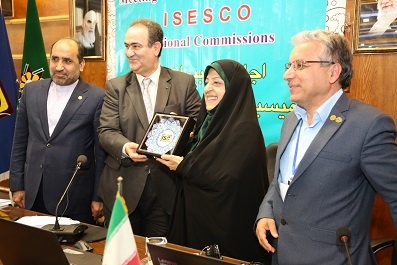Ebtekar Vice President for Women and Family Affairs on the second day of ISESCO Meeting
The Vice President for Women and Family Affairs, providing statistics on the level of education of women and men in the universities of the country, said the proportion of women and men in the undergraduate studies is equal. This amount in postgraduate studies decrease for women is higher than that of men, but suddenly women's participation in the doctoral program is shrinking and the share of women as researchers in 2015 is fluctuating in terms of research, sustainable development, security and peace.
During the second day of the meeting of secretaries General for ISESCO National Commissions, which was held at RICeST in Shiraz, Masoumeh Ebtekar, said about the status of women in science and technology in the Islamic countries: "An important issue for Humanity, especially Muslims, is that they believe that the knowledge of the path of salvation is in the worldly life and in the afterlife, and the true power of life lies in knowledge. Today's knowledge leads to sustainable development and a healthy and happy society.
"We understand the importance of knowledge, and we know that ISESCO has made great strides in this area and has made important gains, but we have a long way to go," said the vice president.
"One of the major issues we face in science and technology is justice in terms of access to opportunities for women and men," he said. Equal access to quality of education is one of the main challenges facing societies, because in some societies women are still far behind in terms of access to quality education.
The Islamic countries are striving to ensure women's and men's access to quality education at all levels, and women are not far from men. This is an Islamic, religious purpose, and is close to our religious principles and didn’t borrowed it from the West. And the main thing is sustainable development that we understand very well.
She mentioned, education and knowledge are not exclusively dedicated to elites, but for all humanity, and we need to facilitate access to educational equity and equal participation of vulnerable groups.
She said: "We need to make policies and targets in order to get women involved in science and technology activities in Islamic countries,”. She added: “Encouraging the younger generation to work in the field of science and advancement in this area is another important issue to be addressed”.
According to Ebtekar, statistics show that 28% of world researchers are women, due to the low women's research activity, women realize that they have different responsibilities in the family for the upbringing of children and support for the family. And we should not ignore the importance of the role of women in the family.
She continued his lecture by providing statistics on the level of education of women and men in the universities of the country. She said the proportion of the percentage of women and men at the undergraduate level is equal. The number of women in a postgraduate studies is higher than that of men, but suddenly women's participation in the doctoral program is shrinking and the share of women as researchers in 2015 is fluctuating in terms of research, sustainable development, security and peace.
According to Ebtekar, unfortunately, in the Islamic countries due to internal wars and internal unrest, women's access to education has decreased, so we need peace in these countries as a prerequisite for the flourishing of science and technology.
She said that the ratio of women and men in the field of research and development is 14 percent, said that the statistics in different countries range from 20 to 40 percent, but women in general contribute less than 20 percent to research and development.
Ebtekar emphasized that the number of female researchers in the fields of science, technology, mathematics and engineering suddenly diminished: ISESCO should have a national plan to address this debate and consider why women's access is low in research and development.
"Women are leading in the areas of education, health, the arts, humanities, and even basic science, but lowered in the field of IT, engineering, manufacturing and production," said the vice president.
She considered one of the main reasons for reducing the activity of women in the aforementioned areas as their preference for playing a native role as one of the main members of the family and emphasized that the government should provide opportunities for women to play the role of motherhood and activities in the field of science and technology play well. To achieve this goal, it is necessary to create day care centers for children, encourage spouses to help women in family affairs, and create more opportunities for women to work in spheres of science and technology in society.


Your Comment :